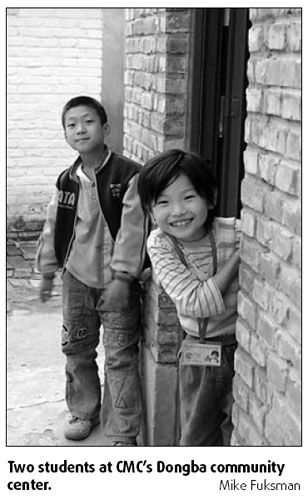Offering migrants a hand up, not a hand out
The Subway sandwich shop is filling with impatient customers, but teenage worker Li Zaiyang is not too fussed. The young migrant worker knows the drill, can work well in a team and is quick to serve. The queue quickly shortens, and Li now has time to pause and think.
The 18-year-old knows he won't be working for Subway forever, and ponders his future with the same optimism as any other teenager in the world.
Li has been employed at the Subway restaurant chain for two months as a result of his training provided by Compassion for Migrant Children (CMC), a group dedicated to improving the lives of migrant children and their families.

Li moved to Beijing with his family from their countryside home in Henan province, and has directly benefited from the vocational skills he learned at CMC's Dongba community center.
"I trained at the center for two and a half months; we celebrated my graduation from the program in January," he says.
For Li, it is not just the tangible workplace skills that he has valued the most it is all about a renewed attitude of hope.
"The vocational skills have been useful, but for me, the most important thing I have learned is about my mind, to change my attitudes and values. These things have changed me and will be useful for my whole life," Li says. "I want to keep working at my job, but I am also thinking about doing something that I really like in the future."
Jonathan Hursh, founder and executive director of CMC, started the group in early 2006, and has been steadily building the program with the help of volunteers.
"We're embedded in the migrant community; kids get engaged seven days a week, and they engage us right back," he says.
There are many NGOs dedicated to aiding the plight of migrant workers; the influx of migrant families to the urban centers of China is "the greatest peacetime migration that's ever been seen, in any country," says CMC's director of operations Charlie Humphreys.
However, CMC differs from other NGOs in that it provides more than just tangible aid such as housing or food.
"When the migrants move from the countryside to the city, the social fabric that was in place in their migrant villages is ripped apart. We try to rebuild that social fabric," says Hursh.
The CMC's community centers bring migrants together and teach them skills that they will need to make a new life in the city, through after-school programs for the younger children and vocational programs for the older children.
CMC has partnerships with Subway, the Ritz Carlton hotel chain, as well as several other businesses.
In addition to after-school and vocational programs targeted at younger migrants, CMC also provides classes and training for migrant parents and teachers.
Family development workshops focus on marriage and child rearing, whereas teacher training gives migrant teachers new techniques and ideas.
"We're seeing a lot of peer learning in the teaching workshops. These private migrant schools saw each other as competition, so the teachers didn't get to engage each other," says Hursh.
"At our workshops, 70 teachers from 20 different schools come together and learn from each other."
Cao Jinghua, a teacher at the Tenglong migrant school, has seen his classroom improve as a result of the teaching sessions.
Cao attended his first session last year, and has been to several of them since then.
"When the kids are talking to each other in class, we used to use the stick to keep them quiet. But now we use a different method, a less intense form of discipline that helps the relationship between student and teacher to be better," he says.
Cao has also integrated more games and stories into his class after learning that these new methods, and has seen his students improve accordingly.
"One of my colleagues really wanted to come after I told him how helpful the sessions were," he says.
Hursh is happy to make a difference. "If we can give this generation a foothold in the city, so that they can get a job and improve by their own merit, I think we can have a lot of positive impact in the communities we're in."
(China Daily 06/29/2009 page8)














